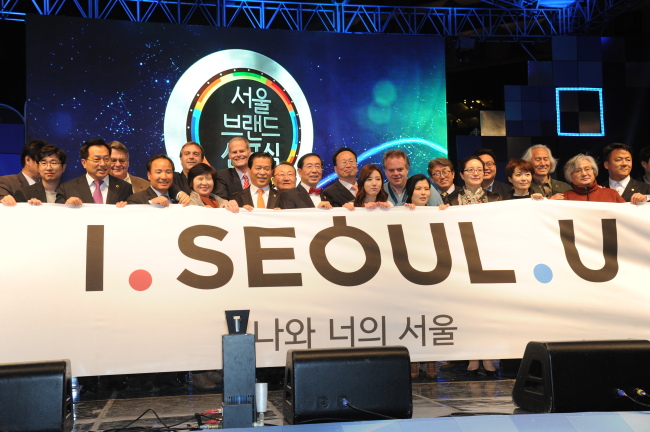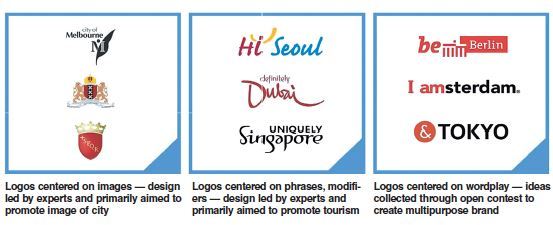“I will Seoul you,” “I will Incheon you.” A flood of mockery and parodies hit social media when Seoul City decided on its new slogan “I.Seoul.U” late last month.
On Oct. 28, “I.Seoul.U” was picked as the capital’s new logo by a public vote, beating two other candidates — “Seouling” and “Seoulmate.” The new slogan will replace “Hi Seoul,” which has been used for 13 years.
 |
| Seoul City Mayor Park Won-soon (center) and guests hold up a placard with the city’s new brand, “I.SEOUL.U,” at a ceremony held at Seoul Plaza on Oct. 28. (Yonhap) |
“I wanted to deliver the message of ‘let’s make Seoul City together that is ever-changing vibrant and dynamic even at this moment’,” said Korean undergraduate Lee Ha-rin, who came up with the slogan idea.
The slogan aimed at emphasizing the city where “you and I” coexist, with the red and blue dots symbolizing passion and relaxation, respectively, she added.
Many, however, raised eyebrows at the slogan, calling it nonsensical “Konglish” with an ambiguous meaning.
“As a Korean designer, I’m embarrassed, to be frank. Despite the simple words, the forced listing of them confuses the meaning,” said Sohn Hye-won, the public relations chief of main opposition New Politics Alliance for Democracy.
The branding guru, renowned for making catchy commercial phrases, participated in the first round of the logo candidate screening.
The city, however, defended the slogan, stressing that wordplay was a new trend in city branding.
In the past, most city branding tended to focus on symbolizing representative architecture or animals in an aim to better identify and promote the image of cities like Melbourne. The selection process was also led by the city authorities or marketing experts.

Cities then gradually moved toward linguistic expressions to better attract tourists, such as “Uniquely Singapore,” “Definitely Dubai” or “Yes! Tokyo.” Seoul’s decadelong logo “Hi, Seoul” along with “Dynamic Korea” are in this category, officials said.
These days, however, cities are turning to a new slogan type that focuses on wordplay and leaves the interpretation open to the public rather than defining the meaning.
“Be Berlin,” “I amsterdam” and “& Tokyo” are examples that do not make perfect linguistic sense but leave the interpretation open to the public.
The slogans of Berlin and Amsterdam reportedly drew similar concerns in the initial stages over the grammar problems, city sources said.
“What we wanted for the new slogan was an open-ended platform that leaves room for the public to freely share and modify it just like ‘be Berlin’ and ‘I amsterdam,’” said Soongsil University journalism professor Kim Min-ki, who led Seoul City’s branding team.
Unlike the two previous slogan trends, another characteristic of the new city branding trend is that the ideas are crowdsourced.
Since July, Seoul City gathered over 16,000 slogan ideas from the public, the largest number in history. Of them, the city selected the three finalists through six rounds.
A number of ideas were discussed in the screening stage, including “Feel Seoul Good,” “Find your Seoul” and “Do Re Mi Fa Seoul.”
The decision was handed over to three votes with different weightings, with 50 percent going to an online vote participated in by 130,000 Seoul residents, 25 percent on an onsite vote by over 1,000 selected individuals, and 25 percent based on a vote by a panel of experts. More than 20,000 of the voters were foreign, including one foreign expert among nine professional voters, officials said.
Interestingly, “Seoulmate” topped the ranking in the online vote, with nearly 40 percent, followed by “I.Seoul.U” with 36.5 percent.
The experts and the majority of the onsite voters, however, picked “I.Seoul.U” after seeing the presentations held for each candidate before the vote. Over 58 percent overall favored “I.Seoul.U,” with a unanimous vote from the experts.
“Experts’ opinions were not unified before the vote. But after the fierce debate over which suits Seoul City’s image better, the experts unanimously made a decision. To be honest, I was surprised,” Kim added.
The experts pointed out that “Seouling” lacked identity while “Seoulmate,” which sounds similar to word “soulmate,” could connote a sexual nuance.
“It was impressive to see citizens make the final decision from slogan nominations that were also brought by the public,” said Sungshin Women’s University professor Seo Kyoung-duk, who participated in the professional panel.
In terms of defining the city’s identity, the city government held several rounds of public discussion earlier this month to decide the key words that represent the city. Upon over a dozen public discussions and surveys, the city summed up the city’s image in three words – coexistence, passion and relaxation.
But critics point out that building a city’s identity requires more than a slogan or brainstorming.
“The identity issue is not the slogan’s problem. It’s the problem of the capital itself. Seoul City needs to keep building a concrete image of the city. For now, any slogans will likely draw identity concerns because the city lacks its own unique colors,” a public relations expert told The Korea Herald, who wished only to be identified by the surname Kwon.

Some also questioned why the city would replace the current slogan of “Hi, Seoul” when it has been actively used for years, raising a suspicion that Mayor Park Won-soon might have pushed for the slogan change to clear the remnants of the previous city government.
The “Hi, Seoul” slogan was determined by the city government and branding experts in 2002 under then-Mayor Lee Myung-bak, who was later elected president.
According to the city-run Seoul Business Agency, the “Hi, Seoul” slogan’s asset value was estimated to be around 29 billion won ($26 million) as of last year.
Despite this asset value, the city said it needed to replace it, citing a tourism marketing strategy dilemma.
“The phrase of ‘Soul of Asia’ below ‘Hi, Seoul’ was not allowed to be used in China by the authorities, posing challenges to carrying out the tourism marketing plans,” said Hwang Bo-youn, the director general of Seoul City’s public communications bureau.
“As the cities evolve and global trends change, the city brand also needs to evolve,” Hwang added.
In the survey last year, about 80 percent of over 2,000 online panels and experts agreed to change the slogan, city officials said.
“‘Hi, Seoul’ was merely the one that was used for long. It wasn’t also a brand that helped improve the Seoul City’s competitiveness or had depth,” design expert Sohn added.
In an apparent move to deny any political motivation, Mayor Park Won-soon remained distant from the slogan project so far. He participated in the vote as an ordinary resident.
“I personally prefer ‘Seouling’ as it sounds active and cool,” Park said in a press conference two days before the new slogan was selected.
The authorities stressed that “I.Seoul.U” is not the city’s exclusive literary property but an open-platform logo that is free to use under the “creative commons license” rule.
“As long as it follows certain criteria, anyone can use the slogan. It’s not only Seoul City’s brand but the world’s brand that be shared and developed by others,” the officials said.
While criticisms prevail, Seoul appears set on sticking with its new brand name and trying to improve public opinion of it.
Seoul City will soon launch “Seoul Partners,” which will be in charge of managing the free commercial use of the brand. Once a private company signs a memorandum of understanding with Seoul Partners, it will be allowed to use the logo for commercial use, they added.
The idea was brought from Amsterdam’s “Amsterdam Partners,” which was launched in in September 2004 along with the new slogan to manage the business of the city brand.
In December, the city will mobilize a sculpture of the new slogan to display around the city center, including Seoul Plaza, to raise the brand awareness, officials said.
The capital will inject about 1.5 billion won into replacing the logo and implementing the marketing plans, they added.
By Lee Hyun-jeong (rene@heraldcorp.com)

